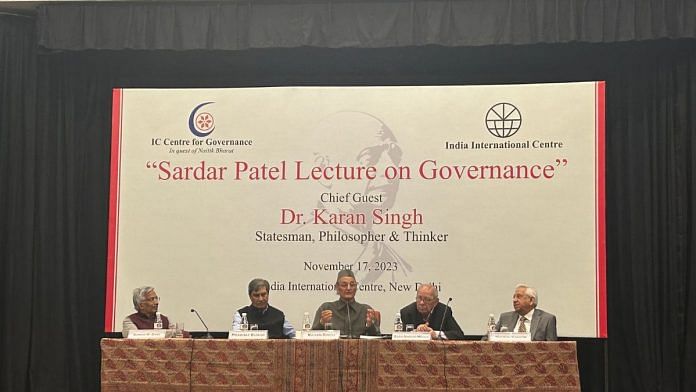New Delhi: India’s bureaucracy is caught in the crosshairs of ideological polarisation between states and the Centre, and it’s one of the biggest challenges bureaucrats face in Narendra Modi’s India; 92-year-old Karan Singh made this important observation recently at Delhi’s India International Centre before a crowd that looked like a sea of grey. Singh, a seasoned Congressman who has said his relations with his party are “almost zero”, also called for bringing back Jawaharlal Nehru’s “excitement” for nation-building.
While Indian democracy functions on a multi-party system, there have been incidents of violence over the years, he stressed.
“The anger that I see now in our political system is very unfortunate. The way people speak in Parliament and even outside is distorting the whole democracy and system of governance,” added Singh after being gently escorted to the stage.
Academics, retired officers, and members of civil society gathered in the heart of the capital to attend the Sardar Patel Lecture on Governance, honouring the man who gave India its prized ‘steel frame’. Organised by the IIC in collaboration with the IC Centre for Governance (ICCFG), the event stayed true to its title. It was one long lecture by Singh, where he came, spoke and left; no discussions, as if it were his Delhi durbar. After an hour-long talk that stressed the challenges of governance faced by Indian bureaucracy, the 100-odd guests moved to high tea, praising Singh for delivering a powerful speech at his age.
Recalling Nehru’s ‘excitement’
Singh, the former Sadr-i-Riyasat of Jammu and Kashmir, echoed the Modi government’s stance when he called upon career bureaucrats to accept lateral entry of private sector professionals.
“We need economic experts and technological experts. One man cannot do everything,” he said.
Singh, the only son of Maharaja Hari Singh of J&K, also recalled his personal interactions with Sardar Vallabhbhai Patel, the man credited with creating the All India Services post-Independence. “I was in a wheelchair for about 18 months [as a teenager]. I couldn’t even turn without help. Sardar came to Jammu and saw me in a wheelchair. He asked my father to send me to America immediately, or I would stay like that for the rest of my life. And it was for that reason I started walking again.”
Also read:
The need for restructuring
The consolidation of nearly 600 princely states under the Indian Union and the creation of the pan-India civil services are among Patel’s notable contributions, Singh pointed out. “There were some views that the civil services should be abolished, but he said if we do not have the civil service, the union will not survive. Sardar left the structure that the British built more or less untouched, the so-called steel frame.” Then, Singh underlined how bureaucracy alone “can’t do the job” and proceeded to give Nehru’s example. “Nehru used to talk about the excitement of building a new India. We need that energy. Governance in a country as large and diverse as India will always be very difficult. We need a sense of commitment.”
Patel died soon after the completion of the consolidation process, in December 1950. But during his lifetime, and particularly during Partition, added Singh, he ensured that the administration was stabilised. “It was two people who steadied the shape of the State: Nehru as PM and Sardar as deputy PM and home minister. They both held the state together.”
The Indian bureaucracy, Singh further said, is also bearing the brunt of politics based on identity, caste and background. For instance, nearly 60 per cent seats in government jobs and higher education institutions are reserved for the Scheduled Tribes (ST), Scheduled Castes (SC), Other Backward Classes (OBC) and Economically Weaker Sections (EWS).“I know that SCs and STs have been used and exploited for centuries, but once you have reservations, where are you going to stop? I think we are going to end up with reservations in one way or the other,” said Singh.
He laid down several other areas that need to be restructured, including streamlining power dynamics in the government and keeping up with Artificial Intelligence (AI), which he said is going to be the “greatest challenge for our administrations.”
Prabhat Kumar, the ICCfG president who welcomed Singh on the stage for the lecture, said that the concepts of governance and government, while often used interchangeably, have a marked distinction. The government has the authority to make laws and policies and enforce them, while governance incorporates the government and actors such as civil society and international organisations. “So basically government is the who of governance, and governance is the how of governing”.
Kumar also pointed out the “explosion of information and the breakdown of asymmetry between government and people” that the rise of citizen activism has caused. “Many people are now engaging in political thought, and that’s why it calls for a new look at governance.”
(Edited by Zoya Bhatti)



